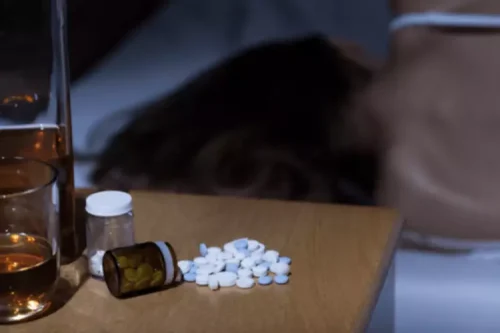The Best Treatment Methods for Meth Addiction

As with all drugs of misuse, seeking professional treatment from mental health and addiction specialists will lead to the highest chance of methamphetamine recovery success. These therapeutic strategies are tailored to address both the psychological facets of addiction and the practical aspects of living a drug-free life. Each therapy type offers unique benefits and, when combined, can provide a robust framework for overcoming methamphetamine addiction. Methamphetamine addiction manifests through a variety of physical and psychological symptoms that can significantly impact marijuana addiction an individual’s health and behavior.
- So, let’s explore the path to supporting a loved one battling meth addiction.
- It affects the brain’s reward system, leading to intense cravings and addictive behavior.
- In these circumstances, involving a professional intervention specialist could take some of the weight off your shoulders.
- Don’t wait for further cognitive and physical decline – take the first step toward a brighter future today.
- When meth use is stopped, withdrawal symptoms like depression and cravings emerge, making addiction recovery challenging.
- With the help of 115 men who had been addicted to morphine, the Narco trial proved that methadone did, in fact, cause dependence.
Why Do People Use Meth?

Overall, methamphetamine is a very addictive substance because of its ability to provide a strong, lasting high. Anyone who is using it regularly could be susceptible to addiction, and you should talk to your friend or loved one about their misuse. The method by which the substance enters the body—for instance, smoking vs. snorting—can modify the impact of the drug and a person’s tendency to become addicted to it. The very intense rush achieved when smoking crystal meth can render its addictive properties even stronger. American Addiction Centers (AAC) is a leading treatment provider and has trusted rehab centers across the country. Contact an admissions navigator with AAC at for advice, information, and admissions related to methamphetamine addiction.
Recovery Programs

Your doctor can assess your overall health by performing a physical exam. They can also refer you to a treatment center and answer any questions you may have. If you — or your loved one — are ready to get treatment, you may find it helpful to bring a supportive friend or family member into the fold. The first step is to recognize any misconceptions you might have about substance use and addiction. It’s important to remember that ongoing drug use changes the brain’s structure and chemistry.
Treatment Options
Medication-Assisted Treatment (MAT) for methamphetamine use disorder integrates pharmacological and behavioral therapies to enhance recovery outcomes. This approach is promising, especially with the development of new pharmacological strategies. The success of support groups in aiding recovery from meth addiction is significantly enhanced by social interaction. Engaging with others who share similar experiences can provide emotional support and practical advice, crucial for long-term recovery.
- These programs are best for mild to moderate cases of meth addiction.
- Desoxyn is rarely prescribed, but when it is, the prescription cannot be refilled, and the doses are far lower than the amount people use when abusing meth.
- The Matrix Model is a comprehensive treatment approach specifically designed to address the challenges of stimulant addictions, including methamphetamine and cocaine.

Key elements of the Matrix model of treatment include individual and family counseling, group therapy, family education and relapse prevention training. Patients also participate in 12-step programs or other self-help group meetings. Contingency management is another popular treatment for meth addiction.
- These symptoms emerge within hours after cessation and vary in intensity and length depending on the individual’s usage history and overall health.
- We stand as your dedicated partner in the journey towards mental health and well-being.
- Methamphetamine, in its crystalline form (crystal meth), has no medical uses.
- Interventions show meth users how their actions affect those that they care about and motivate them to seek help.
Now that you have a greater understanding of meth addiction, the signs, symptoms, and options for treatment, it is time to take the next step toward a new life. The overwhelming impact of meth addiction on someone’s life can make a full recovery seem impossible, but it is not. Finding the most effective treatment program will give you the support and tools you need to overcome your addiction. Start your journey to a life free from meth by seeking the help that you need today. We stand as your dedicated partner in the journey towards mental health and well-being.

The shared experiences, understanding, and encouragement found in these groups can greatly aid in recovery. The need for FDA-approved, meth-specific medications highlights the urgency and importance of continued research in this area. This gap has led to ongoing research efforts aimed at finding effective medications. The synergy between naltrexone, which is often used in opioid and alcohol addiction, and bupropion, an antidepressant, offers a novel approach to treatment.
Learn more about recovery
Additional risks include extreme fatigue and a drastic increase in appetite, which cause physical complications to the recovery process. An inpatient program may be a better option if the individual has engaged in chronic, long-term meth abuse and suffers from the most severe of withdrawal symptoms. This could cause a person to relapse and fall into the old cycle of drug abuse if he or she is not in meth abuse a stable environment. Inpatient rehabs provide a safe place free of temptations or triggers, where people can regain control over their lives without the risk of relapse. These programs usually last between 30 and 90 days depending on the needs of each person.
Av. Hermes da Fonseca, 1542
Bairro: Tirol
Cidade: Natal/RN – Brasil
CEP: 59020-000
[email protected]
+55 (84) 4006.0700